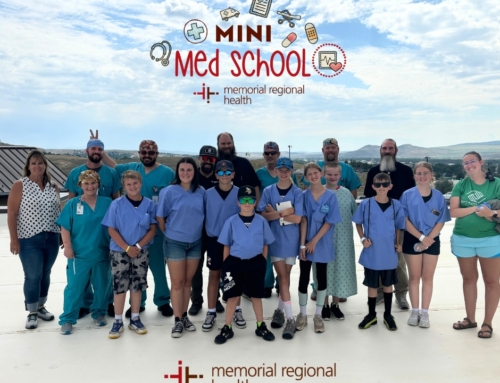Ericka Lucas, physical therapist at Memorial Regional Health, recently completed a training course in pelvic floor function, dysfunction and treatment.
Leaking Urine? Experiencing Pain with Sex?
Pelvic Floor Rehabilitation Therapy Now Available
Pelvic Floor Rehabilitation Therapy Now Available
Don’t miss any updates from Memorial Regional Health by signing up for our every-other-month Living Well newsletter here.
Ericka Lucas, who has been a Physical Therapist at Memorial Regional Health for seven years, explains that for women, leaking urine may be common, but it’s not normal.
“We tend to normalize leaking after pregnancy,” she said. “But I think it’s important for women to know that there are treatment options available.”
Women without children also experience urinary incontinence, Lucas said. In fact, 25% of young women report leaking while doing high-impact activities, such as running or jumping, and this can start as early as middle school. This is a great prevention opportunity. Seeking treatment at a young age or when the problem first occurs may prevent or reduce lifelong issues. Early intervention is most successful.
Lucas, who has two young children herself, recently completed a training course in pelvic floor function, dysfunction and treatment. She is now providing pelvic floor rehabilitation therapies at MRH.
“I’m passionate about pelvic health,” she said. “There are things I’ve struggled with myself, and I want to be able to help others. There are things we can do. People don’t have to live with these symptoms.”
Those with chronic pelvic pain (often with sex), urinary incontinence and pelvic organ prolapse should first discuss their symptoms with their primary care provider. Pelvic pain and symptoms can affect all genders. Men with chronic pelvic pain are also candidates for pelvic floor rehabilitation. If the provider believes rehabilitation therapy is the right path, a referral to pelvic floor therapy will be made.
![Unknown-2[94]](https://memorialregionalhealth.com/wp-content/uploads/Unknown-294-768x1024.jpeg)
Pelvic Floor therapy usually involves a weekly session at MRH Rehabilitation Services and then additional exercises to do at home.
How It Works
First, Lucas fully assesses each new therapy patient. She takes the patient’s history. Depending on the issue, she may measure pelvic floor muscle strength, endurance, coordination and sequencing. She will also assess hip and lower back mobility, core strength, breathing patterns and assess for any pain. She may also request that the patient fill out a bladder/bowel diary which can help identify any patterns and provide a way to track progress. Since the pelvic floor muscles are responsible for so many different functions, she typically finds more than just one symptom or condition that she can treat at the same time.
Then she creates a treatment plan based on her exam findings. Pelvic floor muscles may need to be strengthened or lengthened, or perhaps the muscle sequencing or coordination is impaired. “A lot of times people are told to just perform Kegels, but they may actually need to lengthen those muscles, not strengthen them,” Lucas said. “Research studies have shown that about 40% of women perform these exercises ineffectively, whether it be with muscle compensations and contracting the wrong muscles or impaired muscle sequencing.”
Other treatment plan elements may include bladder retraining, fluid management, eliminating bladder irritants, voiding strategies, manual therapy, dry needling, instruction on proper muscle activation and sequencing, pelvic floor muscle elongation, education on healthy bladder/bowel habits and more.
Patients typically see Lucas once a week and, in between sessions, work on exercises and strategies at home. Treatment continues until function is restored.
“The goal is a return to normal activities and function without leaking or pain,” Lucas said.
Lucas is also working toward being able to assess and treat chronic constipation, fecal incontinence and pediatric pelvic floor issues.
“Before, these patients had to travel out of town for this care,” Lucas said, “and there is typically a waiting list for these services. Now, I think it’s so great that we can provide these services to our community right here in Craig.”






